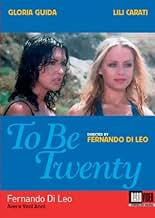IMDb-BEWERTUNG
5,8/10
1345
IHRE BEWERTUNG
Füge eine Handlung in deiner Sprache hinzuTwo young women hitchhike to Rome seeking a free commune and sexual freedom, but instead get entangled with prostitution, police, and a dangerous gang.Two young women hitchhike to Rome seeking a free commune and sexual freedom, but instead get entangled with prostitution, police, and a dangerous gang.Two young women hitchhike to Rome seeking a free commune and sexual freedom, but instead get entangled with prostitution, police, and a dangerous gang.
Carmelo Reale
- Head of rapists
- (as Roberto Reale)
Raul Lovecchio
- Vice-commissioner
- (as Raoul Lo Vecchio)
Salvatore Billa
- Delinquente in Bar
- (Nicht genannt)
Angelo Boscariol
- Cliente in trattoria
- (Nicht genannt)
Empfohlene Bewertungen
I have seen a shortened cut of "Avere Vent'Anni" but now I've watched the full-length version twice and there's a lot more to this film than some people seem to think. Fun is poked at bourgeois society, at self-important males doing jobs they think are important (store detectives, police inspectors), at a rich lesbian, at transcendental meditation, in short at many facets of seventies' life in Italy. Even the two female leads come in for their share. The ending can be seen as having nothing to do with the story, but I think there's more to it: while the girls just flit through life taking nothing seriously except having a good time, lurking at almost every corner is the reality of corrupt policemen and unscrupulous gangsters - the nasty side of the real world ... and in the end that will be their downfall.
There are two reasons to love this flick, well three reasons. Gloria Guida and Lili Carati, plus the big dude who's 'spose to be a spiritual adviser, who's commune is really a front for prostitution and crime. Very much a Steven Seagal lookalike, he provides most of the humour, through his lies and cool front, we almost think the film will take a dangerous turn. You really can't take this disjointed movie seriously even though it's spose to be. Gloria Guida is bloody sexy, and Lil Carati pack some nice goodies. They really love sex, and I love watching them have it. At the start, both are hitching a ride, where they soon wind up at the commune, where we're witness to some quite weird going ons. Carati really has nice, you know, and seems to be the better actress out of the two. Though we're not watching this adult flick (also known as To Be Twenty) for acting ability. An old geezer pharmacist, who needs the girls to show him he's a man again, is the best performer. The girls scarcely get by on stealing stuff, like sandwiches, while also using their beauty. Guida is offered a big proposal by a lesbian talk show host or something, after the commune is raided. If wanting to be serious, this movie has surely misfired on that factor. The more vivacious Carati, and friend, don't mind making out in front of a kneeling Buddhist like figure, face painted like a clown, wearing a forlorn expression that suggests a bad fate, awaits them. The beating track at the film's opening is mesmerizing. A bird watching pic is the purpose, this film mostly serves, thanks to our honeys, Guida, mainly.
In his 1978 film "Avere vent'anni" (To Be Twenty), director Fernando Di Leo attempts to capture the essence of youth, rebellion, and the complexities of growing up during a tumultuous era in Italy. Starring Gloria Guida and Lili Carati as two young women embarking on a journey of self-discovery, the film offers an intriguing blend of drama, comedy, and social commentary. However, despite its promising premise and some noteworthy performances, the movie ultimately falls short of delivering a truly memorable experience.
The film follows Lia (Gloria Guida) and Tina (Lili Carati) as they escape their restrictive lives in search of freedom and adventure. Their journey takes them from the countryside to the bustling city, where they encounter a variety of characters and situations that challenge their beliefs and force them to confront their own naivety. As they navigate their way through this new world, they must also grapple with issues such as sexuality, politics, and the ever-present threat of violence.
One of the film's strongest aspects is its depiction of the social and political climate of 1970s Italy. Di Leo does an excellent job of capturing the tension and unrest that permeated the country during this time, as well as the sense of disillusionment felt by many young people. The film's exploration of these themes adds a layer of depth and relevance that elevates it above a simple coming-of-age tale.
Another highlight of "Avere vent'anni" is the chemistry between Gloria Guida and Lili Carati. Their performances as Lia and Tina are both engaging and believable, effectively conveying the sense of excitement, confusion, and trepidation that comes with being on the cusp of adulthood. The bond between their characters is palpable, and their friendship serves as the emotional core of the film.
However, despite these strengths, "Avere vent'anni" suffers from a number of flaws that prevent it from reaching its full potential. One of the most glaring issues is the film's uneven tone, which oscillates between serious drama and slapstick comedy without ever finding a satisfying balance. This inconsistency can be jarring at times, and it often undermines the emotional impact of certain scenes.
Additionally, the movie's pacing can be sluggish, with some sequences feeling overly drawn out and others rushing through important plot points. This unevenness makes it difficult to fully invest in the story or the characters, and it contributes to a sense of disjointedness that permeates the film.
In conclusion, "Avere vent'anni" is a film with both commendable qualities and significant flaws. While its exploration of 1970s Italian society and the performances of Gloria Guida and Lili Carati are certainly noteworthy, the movie's uneven tone and pacing issues ultimately detract from its overall impact. Despite these shortcomings, however, the film remains an intriguing, if flawed, examination of youth, rebellion, and the search for identity during a tumultuous period in history.
The film follows Lia (Gloria Guida) and Tina (Lili Carati) as they escape their restrictive lives in search of freedom and adventure. Their journey takes them from the countryside to the bustling city, where they encounter a variety of characters and situations that challenge their beliefs and force them to confront their own naivety. As they navigate their way through this new world, they must also grapple with issues such as sexuality, politics, and the ever-present threat of violence.
One of the film's strongest aspects is its depiction of the social and political climate of 1970s Italy. Di Leo does an excellent job of capturing the tension and unrest that permeated the country during this time, as well as the sense of disillusionment felt by many young people. The film's exploration of these themes adds a layer of depth and relevance that elevates it above a simple coming-of-age tale.
Another highlight of "Avere vent'anni" is the chemistry between Gloria Guida and Lili Carati. Their performances as Lia and Tina are both engaging and believable, effectively conveying the sense of excitement, confusion, and trepidation that comes with being on the cusp of adulthood. The bond between their characters is palpable, and their friendship serves as the emotional core of the film.
However, despite these strengths, "Avere vent'anni" suffers from a number of flaws that prevent it from reaching its full potential. One of the most glaring issues is the film's uneven tone, which oscillates between serious drama and slapstick comedy without ever finding a satisfying balance. This inconsistency can be jarring at times, and it often undermines the emotional impact of certain scenes.
Additionally, the movie's pacing can be sluggish, with some sequences feeling overly drawn out and others rushing through important plot points. This unevenness makes it difficult to fully invest in the story or the characters, and it contributes to a sense of disjointedness that permeates the film.
In conclusion, "Avere vent'anni" is a film with both commendable qualities and significant flaws. While its exploration of 1970s Italian society and the performances of Gloria Guida and Lili Carati are certainly noteworthy, the movie's uneven tone and pacing issues ultimately detract from its overall impact. Despite these shortcomings, however, the film remains an intriguing, if flawed, examination of youth, rebellion, and the search for identity during a tumultuous period in history.
Hippie-exploitation movies aren't my cup of tea, but I honestly thought this was worth an exception based on the names involved. Fernando Di Leo is the writer/director of some of the most brutally violent and uncompromising Poliziotesschi movies, Ray Lovelock starred in many classics in that same sub-genre, and Gloria Guida and Lilli Carati, well... they're both just incredibly hot. Alas, though, even in this film all the annoying trademarks of hippie flicks are inevitable. I'm referring to a senseless plot, passive lead characters, unbelievable dumb weirdos in the supportive cast, copious amounts of pointless dancing footage, and a lot of hinting at sex-sequences that never come.
Beautiful brunette Tina and her even more beautiful blond friend Lia are - to put it in their own words - young, hot, and very angry with the world. They travel to Rome, where they join a sort of commune and get in all sorts of trouble. That's pretty much the only synopsis I can give. There's one very enjoyable sequence, namely when the brunette goes out to sell encyclopedias (yes, really!) and drives a university professor insane by making him believe she gets aroused from hearing the word "culture". Everything else is beyond pathetic, like a roommate dressed up as a meditating Pierrot (Leopoldo Mastelloni), and another lunatic who's dressed like "Where's Waldo?" (Vincenzo Crocciti).
"To Be Twenty" is somewhat notorious for featuring an extremely sick and misogynistic climax that totally doesn't fit the overall tone of the film. True, it's very sick, but it doesn't make the film any better or more interesting whatsoever. I also don't understand what Di Leo meant to say with this climax. Does he feel the girls get what they deserve? Is the moral of the story that women are the weaker sex? Or maybe simply that it's too dangerous for women to be traveling alone? All three options are loathsome, in fact.
Beautiful brunette Tina and her even more beautiful blond friend Lia are - to put it in their own words - young, hot, and very angry with the world. They travel to Rome, where they join a sort of commune and get in all sorts of trouble. That's pretty much the only synopsis I can give. There's one very enjoyable sequence, namely when the brunette goes out to sell encyclopedias (yes, really!) and drives a university professor insane by making him believe she gets aroused from hearing the word "culture". Everything else is beyond pathetic, like a roommate dressed up as a meditating Pierrot (Leopoldo Mastelloni), and another lunatic who's dressed like "Where's Waldo?" (Vincenzo Crocciti).
"To Be Twenty" is somewhat notorious for featuring an extremely sick and misogynistic climax that totally doesn't fit the overall tone of the film. True, it's very sick, but it doesn't make the film any better or more interesting whatsoever. I also don't understand what Di Leo meant to say with this climax. Does he feel the girls get what they deserve? Is the moral of the story that women are the weaker sex? Or maybe simply that it's too dangerous for women to be traveling alone? All three options are loathsome, in fact.
In Fernando Di Leo's 1978 crime drama "Avere vent'anni" (English: "To Be Twenty"), the director takes viewers on a gritty and unflinching exploration of Italy's criminal underworld. Set against the backdrop of Rome's seedy underbelly, the film follows the intertwining stories of two young women, Gloria (Gloria Guida) and Liliana (Lili Carati), as they navigate the treacherous world of prostitution, drugs, and exploitation.
Di Leo's directorial approach is both raw and unapologetic, pulling no punches in its portrayal of the harsh realities faced by the film's protagonists. The gritty cinematography and naturalistic acting style lend an air of authenticity to the proceedings, immersing the audience in the sordid world depicted on screen.
Gloria Guida's performance as the naive and vulnerable Gloria is a standout, capturing the character's descent into a life of desperation and exploitation with heartbreaking realism. Lili Carati, on the other hand, brings a sense of world-weariness to her portrayal of Liliana, a seasoned sex worker who has become hardened by the brutal realities of her profession.
While the film's subject matter is undoubtedly challenging and at times uncomfortable, Di Leo handles it with a deft touch, avoiding sensationalism and instead offering a nuanced and empathetic portrayal of the characters' struggles. The director's unflinching lens exposes the harsh truths of a society that often turns a blind eye to the exploitation of its most vulnerable members.
However, "Avere vent'anni" is not without its flaws. The pacing can feel uneven at times, and some of the narrative threads feel underdeveloped or left dangling. Additionally, the film's relentless bleakness can be a bit overwhelming, leaving little room for moments of levity or respite.
Despite its shortcomings, "Avere vent'anni" remains a powerful and thought-provoking exploration of the darker corners of Italian society. Di Leo's masterful direction, combined with the standout performances of Gloria Guida and Lili Carati, make this a film that lingers in the mind long after the credits roll.
Di Leo's directorial approach is both raw and unapologetic, pulling no punches in its portrayal of the harsh realities faced by the film's protagonists. The gritty cinematography and naturalistic acting style lend an air of authenticity to the proceedings, immersing the audience in the sordid world depicted on screen.
Gloria Guida's performance as the naive and vulnerable Gloria is a standout, capturing the character's descent into a life of desperation and exploitation with heartbreaking realism. Lili Carati, on the other hand, brings a sense of world-weariness to her portrayal of Liliana, a seasoned sex worker who has become hardened by the brutal realities of her profession.
While the film's subject matter is undoubtedly challenging and at times uncomfortable, Di Leo handles it with a deft touch, avoiding sensationalism and instead offering a nuanced and empathetic portrayal of the characters' struggles. The director's unflinching lens exposes the harsh truths of a society that often turns a blind eye to the exploitation of its most vulnerable members.
However, "Avere vent'anni" is not without its flaws. The pacing can feel uneven at times, and some of the narrative threads feel underdeveloped or left dangling. Additionally, the film's relentless bleakness can be a bit overwhelming, leaving little room for moments of levity or respite.
Despite its shortcomings, "Avere vent'anni" remains a powerful and thought-provoking exploration of the darker corners of Italian society. Di Leo's masterful direction, combined with the standout performances of Gloria Guida and Lili Carati, make this a film that lingers in the mind long after the credits roll.
Wusstest du schon
- WissenswertesNamed #8 on the list of 10 Best Sexploitation Movies of All Time by website TheCinemaholic in 2017.
- Alternative VersionenThe movie was re-cut shortly after the Italian release. The 81-minute version omits the opening scene on the beach, the sequence featuring explicit lesbian sex between the two main characters, and the violent ending.
- SoundtracksAvere vent'anni
Written by Silvano Spadaccino (as Spadacino), Fernando Di Leo (as Di Leo)
Sung by Gloria Guida
Top-Auswahl
Melde dich zum Bewerten an und greife auf die Watchlist für personalisierte Empfehlungen zu.
- How long is To Be Twenty?Powered by Alexa
Details
- Laufzeit
- 1 Std. 34 Min.(94 min)
- Sound-Mix
- Seitenverhältnis
- 1.85 : 1
Zu dieser Seite beitragen
Bearbeitung vorschlagen oder fehlenden Inhalt hinzufügen




























